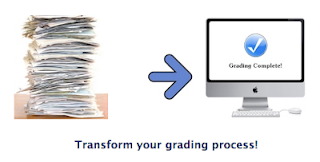 |
| A student pretends to take a really, really difficult final. |
The Research
According to researcher Philip Sadler, in this overview of the research in The Harvard Gazette, it absolutely does matter that teachers know their content:
What our research group found was that for the [content] that people considered factual, teacher knowledge was very important. If the teachers didn't know the facts, they couldn't convey them to the studentsBut if you care about conceptual understanding, knowing your students matters more:
For the kinds of questions that measure conceptual understanding, even if the teacher knew the ... explanation, that wasn't enough to guarantee that their students would actually learn the [content]."It is crucial for teachers to know what misconceptions their students will hang on to, despite instruction. Or as Sadler puts it, paraphrasing Will Rogers:
It ain’t what they don’t know that gives them trouble, it’s what they know that ain’t so.So, how well do you know your students? And how well do you know what they know wrong?
The Bet
Well, finals are coming up... are you willing to put your money where your mouth is?
Make a bet on your students -- predict which answers they'll get wrong. If you share a final with another teacher, you might wager which of you can make the most accurate prediction.
If you've got no one to bet with, you can bet me -- I'll pay up a pack of M&Ms + bragging rights for anyone who can guess, with 70% accuracy, the questions, problems, or items your students will miss the most on your final. And I'm talking peanut or plain.
The Technology To Make Finals Easier
And there is technology that can help you do that (even if you don't want to compare your predictions) -- if you have a final with multiple choice, and even short answers (1-2 paragraphs), you could use a Google Doc form for students to enter their responses,
Flubaroo to help score the work and send out score reports to kids,
And FormEmailer if you want to send out more customized messages to students, directly from your spreadsheet (you might use this if you use a more complex formula to calculate scores, like if you evaluate written items using a rubric, for example.)
(Here's a great tutorial about how to use FormEmailer, from Catlin Tucker's amazing blog.)
At the end, you could check your predictions against what the students actually did: Flubaroo gives back detailed reports about how many students missed each item.
Why not use the final as an opportunity for you to learn something, as well, and work another lever to improve your practice?
As always, let me know if you need help!
Works cited:
Ruell, Peter. "Understanding Student Weaknesses." Harvard Gazette. Harvard University, 30 Apr. 2013. Web. 08 May 2013.



No comments:
Post a Comment
Note: Only a member of this blog may post a comment.